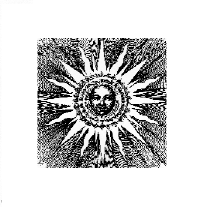Suns
And
Donkeys

The secret is inversion: those values dragged down to us by the Victorians and the Edwardians --- even Hemingway, Fitzgerald, John Dos Passos, Upton Sinclair, Sinclair Lewis --- all turned on their heads, turned upside down in a literary topsy-turvy where right becomes wrong, falsity turns into truth, vice (and madness) a virtue, honesty a lie.
One of the best of Cendars' book is Sky. Here, on the stars:
- All these dead suns, these posthumous rays which take millions of light-years to reach us, asteroids, fragments of dead worlds, shattered and exploded, old moons, flawed and cankered, crusts sores, blotches, cold lupus, devouring leprosy, sanies, and that last drop of pearl-like light, the purest of all, sweating at the highest point of the firmament and about to fall...is not a tear nor a dewdrop, but a drop of pus.
The universe is in the process of decomposing and, like a cemetery, it swarms with becoming and smells good. The stars are unguent-bearing and throb feverishly, each ray carries seeds sown in the brain of man, and they are the seeds of destruction. Grey matter contains sunspots that eat into the whole circumference of the brain. It is an index of disintegration. Thought is a pestilence.
Sky is a book-length meditation on levitation, especially on a Saint of the Roman Catholic Church by the name of Joseph of Copertino who could fly backwards. The book is also a horation on donkeys. Recently, when I was in Mexico, out in the country, I had a chance to meet several friendly donkeys. They put me in mind of Cendrars telling us about Italian donkeys, along with a story about Copertino when he was a lad:
- ...his eyes were fixed on heaven, his mouth agape, he kept stopping, and starting, silently, obstinantly, zigzagging like the donkey who turns the mill or staggers beneath his burden, and slips backwards on the steep hill and gets beaten for his pains.
Everyone has seen these little donkeys in Italy, skinny creatures who walk as if they had sprained their ankles, half-smothered beneath their load, their backs rubbed raw, the sores on their haunches kept constantly open by their master's crooked stick and the swarms of blue-bottles; they hang their heads down lamentably, their heads with those atrophied wings, the angelic eyes of the ass, one of which is often broken and the other ocellated with a cyst.
The little creature is the very image of humility and resignation, but have you ever put your arms around one of these donekys' muzzles? Their gaze is unfathomable. Under their frizzy skulls, great philosophical thoughts are churning, as well as plenty of lively humor, a repressed wildness, and something strangely fraternal, which makes them wink their eyes and smile.
ORISON: Prayers that we may go to Heaven with the asses O Lord.
And, as I was buying her --- I swear to you --- I looked into her eyes, observed the lines of her mouth, and I knew that Cendrars was right: Platera is smiling with some divine wisdom.